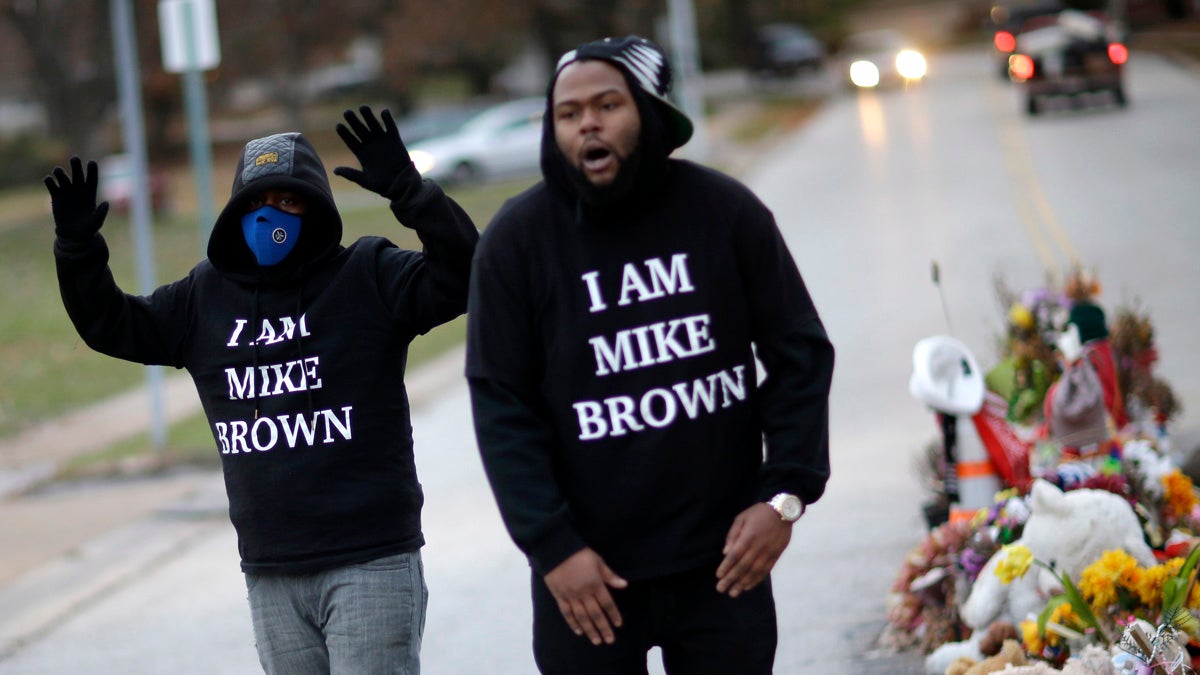How my son’s friend helped me understand Ferguson (a little) on Facebook

Protesters gather near a memorial in the middle of the street in Ferguson, Missouri, on Nov. 24, 2014, more than three months after a white policeman shot and killed Michael Brown, a black 18-year-old man, there. A grand jury later that night released its decision not to indict the the police officer. (AP Photo/David Goldman)
My younger son came home from college in New England last week. We had been apart for 77 days, by far the longest time either of my kids has been out my reach.
When I first saw him after I got home from work, we immediately embraced. As our beagle, Harry, bayed enthusiastically, we held the hug longer than any hug since he was maybe 8. It was my way of saying: “OK, I know you can take care of yourself far from home, but that doesn’t mean I have to like it!”
I was still feeling that hug, and my son’s presence, as I encountered a post from one of his childhood friends on Facebook. The words, from a young black man I’d known since he was in kindergarten, told a story of pain and anger in the wake of the decision from the Ferguson grand jury.
As I read the post, visions of the two boys marching in a Halloween parade when they were 5 flickered in my mind. I could hear their voices — both before and after they changed — arguing endlessly over Marvel versus DC comics.
My emotions unraveled as the intention of his post became clear to me. It boiled down to this: “Hey, white America, shut the hell up, because you know absolutely nothing about what it’s like to grow up as a black man in this country.”
I had thought of this young man often after he left for college in September, also in New England. Just a few days before he left for school, I’d hugged him and made him promise he’d visit when he was back in town. Now, reading his words, I shared his rage, although I will never fully be able to grasp his perspective, because of a simple quirk of genetics: I am white.
As I read the post over and over again, another, starker meaning emerged. It took a while for me to discern it, I think, because I didn’t want it to be true. My son’s best friend was saying: “Next time, it could be me.”
I do not know enough about the Michael Brown shooting to talk directly about it. I strongly believe ill-informed media commentary and social media hysteria have caused much suffering as the nation struggles to deal with what happened. Even if I were to comment on it directly, I doubt I could add anything of value to this young man’s anguished cry.
Yet the empty Facebook comment box stared at me. I wanted to fill it with something that could make my son’s friend feel better and, maybe, less angry. Something about how there are plenty of white people who at least want to understand. Something about hope in the face of adversity. Ultimately, I concluded this was not my place. He needed his anger in that moment. So I struggled to think of something absolute to say. Something unquestionable.
Silently, I prayed for healing, and I typed: “I love you.”
WHYY is your source for fact-based, in-depth journalism and information. As a nonprofit organization, we rely on financial support from readers like you. Please give today.

